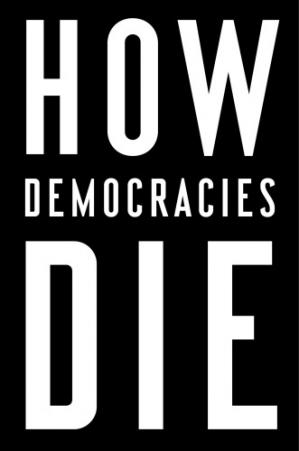 Zusammenfassungen
Zusammenfassungen
 Donald Trump’s presidency has raised a question that many of us never thought we’d be asking: Is our democracy in danger? Harvard professors Steven Levitsky and Daniel Ziblatt have spent more than twenty years studying the breakdown of democracies in Europe and Latin America, and they believe the answer is yes. Democracy no longer ends with a bang—in a revolution or military coup—but with a whimper: the slow, steady weakening of critical institutions, such as the judiciary and the press, and the gradual erosion of long-standing political norms. The good news is that there are several exit ramps on the road to authoritarianism. The bad news is that, by electing Trump, we have already passed the first one.
Donald Trump’s presidency has raised a question that many of us never thought we’d be asking: Is our democracy in danger? Harvard professors Steven Levitsky and Daniel Ziblatt have spent more than twenty years studying the breakdown of democracies in Europe and Latin America, and they believe the answer is yes. Democracy no longer ends with a bang—in a revolution or military coup—but with a whimper: the slow, steady weakening of critical institutions, such as the judiciary and the press, and the gradual erosion of long-standing political norms. The good news is that there are several exit ramps on the road to authoritarianism. The bad news is that, by electing Trump, we have already passed the first one.
Drawing on decades of research and a wide range of historical and global examples, from 1930s Europe to contemporary Hungary, Turkey, and Venezuela, to the American South during Jim Crow, Levitsky and Ziblatt show how democracies die—and how ours can be saved.
 Is our democracy in danger? It is a question we never thought we’d be asking. We have been colleagues for fifteen years, thinking, writing, and teaching students about failures of democracy in other places and times—Europe’s dark 1930s, Latin America’s repressive 1970s. We have spent years researching new forms of authoritarianism emerging around the globe. For us, how and why democracies die has been an occupational obsession.
Is our democracy in danger? It is a question we never thought we’d be asking. We have been colleagues for fifteen years, thinking, writing, and teaching students about failures of democracy in other places and times—Europe’s dark 1930s, Latin America’s repressive 1970s. We have spent years researching new forms of authoritarianism emerging around the globe. For us, how and why democracies die has been an occupational obsession.
But now we find ourselves turning to our own country. Over the past two years, we have watched politicians say and do things that are unprecedented in the United States—but that we recognize as having been the precursors of democratic crisis in other places. We feel dread, as do so many other Americans, even as we try to reassure ourselves that things can’t really be that bad here. After all, even though we know democracies are always fragile, the one in which we live has somehow managed to defy gravity. Our Constitution, our national creed of freedom and equality, our historically robust middle class, our high levels of wealth and education, and our large, diversified private sector—all these should inoculate us from the kind of democratic breakdown that has occurred elsewhere.
Yet, we worry. American politicians now treat their rivals as enemies, intimidate the free press, and threaten to reject the results of elections. They try to weaken the institutional buffers of our democracy, including the courts, intelligence services, and ethics offices. American states, which were once praised by the great jurist Louis Brandeis as “laboratories of democracy,” are in danger of becoming laboratories of authoritarianism as those in power rewrite electoral rules, redraw constituencies, and even rescind voting rights to ensure that they do not lose. And in 2016, for the first time in U.S. history, a man with no experience in public office, little observable commitment to constitutional rights, and clear authoritarian tendencies was elected president.
What does all this mean? Are we living through the decline and fall of one of the world’s oldest and most successful democracies?
 Dieses Buch erwähnt ...
Dieses Buch erwähnt ...
 Personen KB IB clear | Adolf Hitler , Donald Trump |
 Aussagen KB IB clear | Donald Trump gefährdet die Demokratie |
 Begriffe KB IB clear |  Demokratie Demokratie democracy
, democracy
,  Europa Europa Europe
, Extremismus
, Europe
, Extremismus
,  Freiheit Freiheit freedom
, freedom
,  Gewalt Gewalt violence
, violence
,  Lüge Lüge lie
, lie
,  Politik Politik politics
, politics
,  social media / Soziale Medien social media / Soziale Medien social networking software
, social networking software
,  USA
, USA
,  Zukunft Zukunft future future
|
 Tagcloud
Tagcloud
 Volltext dieses Dokuments
Volltext dieses Dokuments
 Anderswo suchen
Anderswo suchen 
 Beat und dieses Buch
Beat und dieses Buch
Beat hat dieses Buch während seiner Zeit am Institut für Medien und Schule (IMS) ins Biblionetz aufgenommen. Beat besitzt kein physisches, aber ein digitales Exemplar. (das er aber aus Urheberrechtsgründen nicht einfach weitergeben darf). Es gibt bisher nur wenige Objekte im Biblionetz, die dieses Werk zitieren.










 Biblionetz-History
Biblionetz-History